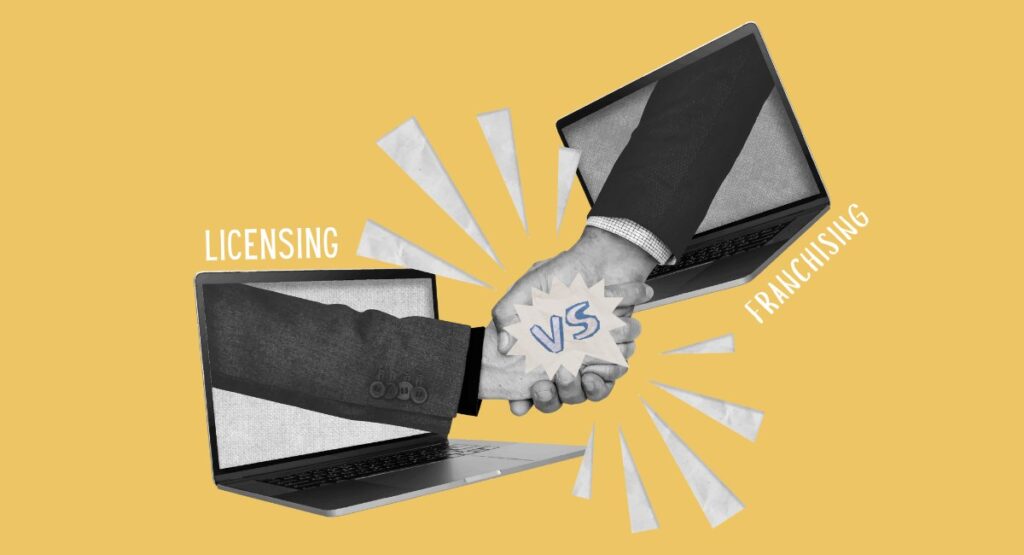Licensing vs Franchising in the UAE: Which Option Fits Your Business in 2025?

Expanding your business into the UAE is exciting, but let’s face it, it can also feel overwhelming. Between navigating regulations, understanding the market, and figuring out how to actually enter it, there’s a lot to unpack.
The good news? If you’re eyeing the UAE’s booming economy, with a projected 5% GDP growth in 2025, you’re already on the right track. The next step? Choosing the best strategy to break in and for most businesses, that means deciding between licensing and franchising in the UAE.
Not sure which one fits your vision? Let’s walk through both options — the real-world way.
Table of Contents
ToggleSo, What Exactly Is Licensing?
Think of licensing as renting out your intellectual property, trademarks, patents, or even tech solutions in exchange for a fee. You retain ownership, while the licensee uses it under a predefined agreement.

In the UAE, this is especially popular among companies that don’t want to be too hands-on but still want their brand or IP to generate revenue. You license it out and let someone else handle daily operations, with minimal hands-on involvement from your side.
The Legal Lowdown
The UAE has pretty solid legal protections when it comes to IP (Intellectual Property). Your licensing agreement will fall under the UAE Civil Transactions Law and the country’s Federal Law on Intellectual Property Rights. And yes, you’ll need to register your IP with the Ministry of Economy if you want any real teeth when it comes to protecting your rights.
What’s It Gonna Cost?
Licensing is generally more cost-effective than franchising. You’ll need to pay for a good tax consultant (worth every dirham), register your IP, and sort out your trade license. For mainland business setups, expect licensing fees to range between AED 10,000 and AED 15,000, depending on your business activity and location.
Why Consider Licensing?
- Low Investment: You don’t need a pile of cash to get started.
- Quick Market Entry: The licensee handles operations, so your brand gets out there faster.
- Shared Risk: You expand your reach without being buried in operational headaches.
Franchising: A More Structured (But Rewarding) Ride
Franchising takes a more structured and often more involved approach. It means letting someone else (the franchisee) operate under your established brand. They’ll use your systems, trademarks, processes and everything that makes your business tick. You’re essentially cloning your successful business setup.

This model is big in the UAE, especially in sectors like food & beverage, education, and retail. That’s because it ensures a consistent brand experience, no matter the location.
Wait — What About the Legal Part?
Interestingly, the UAE doesn’t have a specific law dedicated solely to franchising. But most arrangements are governed by Federal Law No. 3 of 2022 on Commercial Agencies or are contractually structured under UAE Civil Law, depending on the arrangement. It lays out who’s responsible for what, how to handle disputes, and why crystal-clear contracts are non-negotiable. (Pro tip: consult a legal advisor to make sure everything’s airtight.)
Costs You Should Expect
Franchising comes with higher upfront costs. You’ll need to factor in franchise fees, location fit-outs, and ongoing royalties. If you’re looking for a business setup in a UAE free zone, startup costs can range anywhere from AED 5,000 to AED 50,000. Costs vary significantly based on the free zone and nature of your business.
Why Franchising Might Be Worth It
- Brand Recognition: People already trust your name.
- Support Systems: Franchisees often get training, supply chain help, and marketing tools.
- Scalability: You can scale more rapidly without directly managing each new outlet.
Licensing vs. Franchising — Let’s Put It Side by Side
| Aspect | Licensing | Franchising |
| Control | You have limited control | You maintain significant control |
| Initial Investment | Lower setup cost | Higher startup cost |
| Brand Consistency | Depends on the licensee | Enforced by the franchisor |
| Legal Complexity | Simpler agreements | More detailed and legally dense |
| Support Provided | Not much beyond the IP itself | Training, operations, marketing, etc. |
| Revenue Model | Royalties or flat fees | Franchise fees + ongoing royalties |
Strategic Questions to Ask Yourself Before You Choose

Is your business IP-heavy or service-driven?
If you’re in the game of tech, inventions, or unique products, licensing might be your sweet spot. But if you’ve built a service brand that relies on customer experience like a gym, café, or boutique, franchising is probably the way to go.
Do you want more control or more freedom?
Licensing gives you the freedom to let others run the show. Franchising, on the other hand, keeps you in the driver’s seat — but with that comes more responsibility.
Have you done your homework on the UAE market?
Yes, the UAE is business-friendly, but it’s also incredibly diverse. What works in Dubai might not fly in Sharjah. Take the time to research cultural preferences, local competition, and consumer demand before jumping in.
Are you ready to comply with all the rules?
Both licensing and franchising require approvals from relevant UAE authorities, whether you’re setting up in a free zone or on the mainland. And let’s not sugarcoat it: UAE regulations can be tricky. A local legal expert isn’t just helpful — they’re essential.
Final Thoughts
At the end of the day, the choice between licensing and franchising in the UAE isn’t about which one’s “better.” It’s about which one aligns with your goals, budget, and appetite for involvement.
Licensing is great if you’re looking for a lean, low-risk way to monetize your IP. Franchising, on the other hand, is perfect for entrepreneurs who want to scale with structure — and don’t mind putting in a bit more upfront.
Either way, the UAE is teeming with potential. With solid legal guidance and a clear-eyed strategy, 2025 could be the year your brand truly goes global.
Disclaimer :
This content is for informational purposes only and does not constitute legal, financial, or immigration advice. Please consult an official government source or licensed advisor for the most up-to-date requirements.
Sources:
- Emirates NBD Research – UAE Macroeconomic Update
- Central Bank of the UAE – Publications
- UAE Ministry of Economy – Intellectual Property Protection
- Dubai Department of Economic Development (DED)
- Sharjah Economic Development Department (SEDD)
- UAE Ministry of Justice (MOJ)
- Dubai Multi Commodities Centre (DMCC) Free Zone
- Ras Al Khaimah Economic Zone (RAKEZ)
- International Free Zone Authority (IFZA)
- Franchise UAE
- Hadef & Partners Law Firm
- Al Tamimi & Company Law Firm
- UAE Government Portal – Business Setup
- UAE GDP to grow by 5 percent in 2025: Report
FAQ
1. Which is more suitable for business expansion in the UAE: licensing or franchising?
Choosing between licensing and franchising depends heavily on your business model, goals, and how much control you want to maintain. Licensing works best if your business is IP-driven, say, a tech product, patent, or trademark that you want to monetize with minimal operational involvement. It’s a lighter, quicker way to enter the market with less upfront investment. On the flip side, franchising suits brands that rely on a consistent customer experience, such as cafes, gyms, or retail stores. Franchising offers more control, brand consistency, and structured growth, but it comes with higher costs and more legal complexity. Ultimately, the choice hinges on your appetite for involvement, budget, and long-term vision in the UAE’s dynamic market.
2. Are there specific legal requirements for franchising in the UAE?
Interestingly, the UAE does not have a dedicated franchise law yet, which can be a bit of a legal gray area. However, franchising agreements typically fall under Federal Law No. 3 of 2022 on Commercial Agencies, which governs relationships between principals and agents. This law emphasizes the importance of clear, comprehensive contracts defining roles, responsibilities, and dispute resolution mechanisms. Additionally, registering your franchise as a commercial agency in certain emirates may be required. Given the nuances and local legal interpretations, partnering with a UAE-based legal expert is essential to navigate compliance and protect your brand’s interests effectively.
3. Do licensing agreements require registration in the UAE?
Yes, to ensure robust legal protection, your intellectual property (IP) associated with a licensing agreement should be registered with the UAE Ministry of Economy. Whether it’s trademarks, patents, or copyrights, registration grants you enforceable rights against infringement and unauthorized use. While the licensing contract itself doesn’t always need to be registered to be valid, having your IP officially registered is highly advisable—this is the backbone that supports your licensing deal’s enforceability and legitimacy in the UAE’s legal framework.
4. What are the cost implications of licensing versus franchising in the UAE?
Licensing is generally the more cost-effective path. Initial setup costs are lower since you’re primarily licensing IP rights without the need to establish operational infrastructure or offer extensive support. Expect to pay for IP registration, trade licensing (roughly AED 10,000 to AED 15,000 depending on emirate and activity), and legal fees. Franchising, conversely, requires a heftier financial commitment upfront. Alongside franchise fees and trade licenses, you must budget for location setup, training, ongoing royalties, and marketing support. Free zone costs vary widely (AED 5,000 to AED 50,000+), so the total investment depends heavily on the franchise model and location. Weighing these cost differences is crucial when planning your UAE expansion strategy.
5. Can foreign investors engage in franchising or licensing in the UAE?
Absolutely, foreign investors are welcome to engage in both franchising and licensing in the UAE. The country’s open economy encourages international business partnerships, though certain regulations apply. For mainland setups, foreign investors typically require a local sponsor or partner holding 51% ownership unless operating under specific free zone jurisdictions that offer 100% foreign ownership. In franchising, clear contracts and compliance with commercial agency laws are mandatory. Licensing arrangements also require proper IP registration and trade licenses. Navigating these rules can be complex, so seeking professional legal and business advice is essential to ensure your investment aligns with UAE laws and maximizes growth potential.
